Biotics 8 is a probiotic supplement specifically designed to support men’s gut health and naturally address common health issues experienced by many men, including constipation and dwindling testosterone levels. (1, 2)
Packing 10 research-backed strains of probiotics plus prebiotics, vitamin D, and digestive enzymes, Biotics 8 may be appropriate for promoting general gut and immune health and improving symptoms related to certain digestive issues, such as irritable bowel syndrome (IBS). (3, 4)
But is Biotics 8 the right choice for you? To help you decide whether Biotics 8 may be a worthwhile investment in your health, we thoroughly analyzed Biotics 8’s formula, dose, clinical evidence, and value, comparing it to similar products on the market.
Medical disclaimer: This article is intended for educational and informational purposes only. It is not intended as a substitute for medical advice. For health advice, contact a licensed healthcare provider.
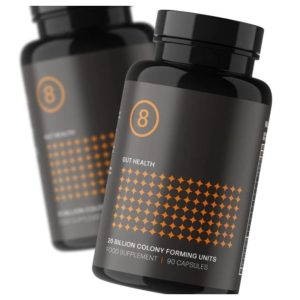

Key product features
What you should know
Made with bacterial strains known to support digestive, hormonal, and immune health, Biotics 8 offers solid potential health benefits for men. (3, 4, 5)
- We like the fact that Biotics 8 is made with 10 evidence-backed probiotic strains and offers a 100% satisfaction 60-day money-back guarantee.
- This product costs $2.67 per serving, which is much more expensive than similar probiotic products on the market.
- Some of the bacterial strains and other ingredients in Biotics 8, such as Bifidobacterium longum and vitamin D, may promote and improve immune and gut function, support bone health, and protect against certain health conditions. (6, 7, 8)
Biotics 8 overview
Biotics 8 is a multi-strain probiotic that also contains prebiotics, vitamin D, and digestive enzymes. Though the bacterial strains and other ingredients in Biotics 8 may benefit both men and women, Biotics 8 is marketed toward men looking for a natural way to boost their digestive health, sexual health, immune system, and more.
Probiotics are live microorganisms that can benefit certain aspects of health, such as digestion, when consumed in specific amounts. (8)
Probiotics are found in your digestive system and are concentrated in certain foods, such as fermented foods like yogurt, kimchi, and sauerkraut. In addition to being found in foods and your body, probiotics can be taken in supplement form. Though there’s still much to learn about how supplemental probiotics impact the body, studies show that certain probiotic strains, such as the strains included in Biotics 8, can positively affect health in several ways, such as decreasing digestive symptoms, like constipation and diarrhea, and improving body composition. (9, 10)
In addition to 10 strains of probiotics, which we’ll cover in more detail below, Biotics 8 is made with vitamin D3, prebiotics, and three digestive enzymes, all of which play important roles in health. For example, vitamin D is a fat-soluble nutrient that’s involved in critical processes such as promoting the absorption of calcium in the gut, maintaining bone health, stimulating muscle cell growth and development, and supporting immune function. (11)
Prebiotics are nutrients that are broken down by gut bacteria in your large intestine. Bacteria in your gut break down or ferment prebiotics, which releases byproducts called short-chain fatty acids (SCFAs). SCFAs act as a fuel source for cells that line the colon, strengthen the gut barrier, and regulate intestinal inflammation. Prebiotics also stimulate the growth of beneficial bacteria, supporting the maintenance of a healthy and balanced gut. (12)
The added digestive enzymes in Biotics 8 may also improve some digestive symptoms, such as cramping and bloating in some populations, such as in people with IBS. (13)
Each three-capsule serving of Biotic 8 contains 20 billion colony-forming units (CFUs) of evidence-based probiotic bacteria and yeast strains, such as Lactobacillus acidophilus and Saccharomyces boulardii. CFUs represent the number of live bacteria per dose. Research suggests that to be effective, probiotics should contain a minimum concentration of 106 (1,000,000) viable CFUs per gram. (14) This will help ensure more probiotics move through the digestive process and enter the intestine alive, to do their job.
Though Biotics 8 exceeds this requirement, the company does not guarantee that the bacterial strains in this formula are viable past the product’s shelf life, which experts recommend looking for when you’re shopping for a probiotic supplement. Probiotics can die during their shelf life, so it’s best to choose a product labeled with the number of CFUs at the end of its shelf life, not at the time of its manufacture. (15) Because Biotics 8 is a pricey product, we’d like to see the company guarantee its CFUs through its shelf life.
Another downside is that this product isn’t third-party tested for quality and purity. We expect that a supplement at this price point would be third-party tested. Third-party testing ensures that dietary supplements meet specific safety standards and that products contain what’s stated on their label, which is why health experts generally recommend purchasing third-party tested supplements.
The probiotics, prebiotics, digestive enzymes, and vitamin D in Biotics 8 are packed into vegetarian HPMC (hydroxypropyl methylcellulose) capsules, which are plant-based and support superior absorption in the digestive tract.
Unlike many probiotic products, Biotics 8 is shelf-stable, meaning it doesn’t require refrigeration. This makes it an excellent choice for those who prefer to take their probiotics on the go. Another major plus is that Biotics 8 offers a 100% satisfaction 60-day money-back guarantee. This means that you can send the product back for a full refund if you’re not completely satisfied with it or if it doesn’t have a measurable impact on your health.
Each three-capsule serving of Biotics 8 costs $2.67, which is expensive compared to other probiotic products on the market. For example, Seed DS-01® Daily Synbiotic, a supplement that contains 24 strains of beneficial probiotics plus prebiotics, costs $1.67 per serving. Plus, Seed is third-party tested.
Nonetheless, Biotics 8 may be a worthwhile supplement for men who want to improve their digestive health, support optimal immune function, and ease symptoms of certain health conditions. (3, 4, 5)
Biotics 8 ingredients
Biotics is made with 10 probiotic strains:
- Lactobacillus acidophilus
- Lactobacillus casei
- Lactobacillus paracasei
- Lactobacillus rhamnosus
- Lactobacillus plantarum
- Lactobacillus fermentum
- Bifidobacterium longum
- Bifidobacterium bifidum
- Bifidobacterium breve
- Saccharomyces boulardii
Studies show that, when taken in supplement form, many of these strains may positively impact health.
For example, Biotics 8 contains probiotic strains that have been shown to improve digestive symptoms like constipation. A 2022 study that included 153 people with functional constipation found that treatment with a combination of Lactobacillus acidophilus, Bifidobacterium bifidum, and Lactobacillus rhamnosus, and treatment with a combination of Lactobacillus acidophilus, Bifidobacterium bifidum, Lactobacillus rhamnosus, Lactobacillus paracasei, Bifidobacterium longum, Bifidobacterium lactis, Lactobacillus casei, and Bifidobacterium animallis for four weeks were both effective for increasing bowel movement frequency and stool quality. (16)
Other strains found in Biotics 8, such as Lactobacillus rhamnosus and Bifidobacterium breve, may help relieve symptoms of IBS. A 2023 review of 73 studies found that different probiotic formulations including those containing strains found in Biotics 8, such as Lactobacillus and Bifidobacterium species, were significantly more effective for improving IBS symptoms, like bloating and diarrhea, compared to placebo treatments. (17)
In addition to supporting gut health, Biotics 8 is marketed as a way for men to improve their body composition and lose weight. A 2024 review of six studies found that the use of probiotic supplements in the absence of dieting led to a significant reduction in body weight in 66.6% of the included studies, a significant reduction in waist circumference in 80% of the included studies, and a reduction in total body fat. The review also found that a combination of Bifidobacterium and Lactobacillus strains, including some strains found in Biotics 8, was the most effective. (18)
While these results are promising, not all studies have found probiotics to be effective for supporting weight loss. (19)
Though supplementation with the probiotic strains found in Biotics 8 is linked to several health benefits, some of the claims made on the Biotics 8 website aren’t backed by sound science. For example, the company claims that taking Biotics 8 may be effective for increasing testosterone levels, citing a 2017 study. The study did find that probiotic supplementation improved testosterone levels, sperm concentration, and sperm count. Unfortunately, the formula used in this study is completely different from Biotics 8. The product in this study contained a much larger dose of Lactobacillus paracasei than what’s found in Biotics 8, plus ingredients not found in Biotics 8 such as the starch-like fiber arabinogalctan (which acts as a prebiotic) and the amino acid L-glutamine. (5)
Currently, there’s no significant evidence that probiotic supplements are effective for increasing testosterone. (20) So, although Biotics 8 may support digestive health, ease symptoms of IBS, and help you maintain a healthy body weight, you shouldn’t rely on probiotic products if you’re hoping to boost your testosterone levels.
In addition to the 10 probiotic strains, Biotics 8 also contains vitamin D and prebiotics.
A dose of Biotics 8 provides 400 IU (10 micrograms) of vitamin D, which covers 66% of the recommended daily intake for adults aged 18-70. (11) Probiotics have been shown to help increase the absorption of vitamin D, so this combination can be beneficial. (21)
Vitamin D plays essential roles in men’s health, including supporting bone growth and mineralization, protecting against fracture risk, and maintaining muscle strength. (11) It’s essential for men to maintain optimal vitamin D levels in order to promote physical and mental health. (11) Some research also suggests that maintaining optimal vitamin D levels can help reduce the risk of common medical conditions that impact men, such as prostate cancer. (22)
Though Biotics 8 does contain vitamin D, the dose isn’t high enough to treat low or deficient vitamin D levels. If you’re deficient in vitamin D, your healthcare provider will likely recommend a higher dose supplement in order to boost your levels. (23)
Lastly, Biotics 8 contains prebiotics and digestive enzymes. Prebiotics, such as the inulin in Biotics 8, fuel beneficial bacteria in the digestive tract, supporting an overall healthy and more balanced microbiome, while digestive enzymes like lipase, amylase, and protease, are necessary for the digestion and absorption of fat, carbs, and protein, respectively. (12, 13)
A dose of Biotics 8 only contains 45 mg of inulin, a type of carbohydrate derived from plants such as chicory, garlic, and asparagus, which is considered a very tiny dose. Most studies investigating the health effects of inulin on the digestive system use doses of at least 5 grams (g) per day. It’s unclear if the miniscule amount of inulin in Biotics 8 would have any significant impact on gut health. (24)
Biotics 8 also contains a small amount of another type of prebiotic called fructooligosaccharides (FOS), which could boost levels of beneficial gut bacteria like Bifidobacterium species when taken in supplement form. But, like inulin, FOS are effective in doses much higher than the 25 mg found in a dose of Biotics 8. Studies show that daily doses exceeding 5 g per day are most effective for supporting gut health. (25)
Also, although digestive enzymes are necessary for some people and helpful for certain medical conditions, such as irritable bowel syndrome and pancreatic insufficiency, there’s little evidence that taking digestive enzymes offers any benefits to healthy people. (13, 26)
Biotics 8 side effects
Though probiotic products like Biotics 8 are generally safe for most people, they’re not appropriate or necessary for everyone. Research on the health effects of probiotics is still in its infancy, and it’s important to note that the long-term safety of probiotic supplements is still being investigated.
Probiotics aren’t safe for people with weakened immune systems, such as those with certain types of cancers. In vulnerable populations, such as older adults and people with weakened immune systems, taking probiotics supplements may cause an overgrowth of bacteria in the gut and increase infection risk. (27)
Biotics 8 isn’t appropriate for children, and parents and caregivers should always check with a healthcare provider before giving probiotics to children and teens. (27)
In addition to not being appropriate for some populations, probiotics may cause side effects. For example, probiotics can trigger uncomfortable gastrointestinal symptoms, such as gas, diarrhea, and bloating. Though probiotic-related side effects are more common when you first start taking them and generally tend to get better with time, probiotic supplements may not agree with everyone. (28)
Lastly, probiotic supplements may affect the absorption, efficacy, and safety of some medications, such as cancer medications and blood thinners. (29)
If you’re interested in starting a probiotic like Biotics 8, it’s important to consult your healthcare provider to ensure it’s the right choice for you.
Specs
| Cost per serving | $2.67 |
| Dosage | 3 capsules per day |
| Strains | Lactobacillus acidophilus, Lactobacillus casei, Lactobacillus paracasei, Lactobacillus rhamnosus, Lactobacillus plantarum, Lactobacillus fermentum, Bifidobacterium longum, Bifidobacterium bifidum, Bifidobacterium breve, Saccharomyces boulardii |
| Third-party tested? | No |
| Other ingredients | Vitamin D, inulin, fructooligosaccharides, lipase, amylase, protease |
We’ve featured Biotics 8 in:
Who Biotics 8 is recommended for:
Biotics 8 is specifically recommended for men. Though the formula may also benefit women, the Biotics 8 website claims this probiotic is crafted for men’s gut health. Men of all ages could consider this product, including:
- Men over 40
- Men with digestive symptoms, like diarrhea
- Men under stress, such as male students
Keep in mind that while probiotics have been linked with health benefits, they’re not a cure-all and shouldn’t be considered a replacement for a healthy diet and lifestyle. To get the most out of probiotic supplements, such as Biotics 8, men should pair probiotics with a nutritious diet, regular exercise, and stress management for optimal physical and mental health.
Who Biotics 8 is not recommended for:
Probiotics supplements, like Biotics 8, aren’t a good fit for everyone. (30) It’s recommended that the following populations speak with their healthcare provider before taking probiotics:
- Immunocompromised people, such as those with conditions like cancer and HIV
- People with certain digestive conditions, like short gut syndrome, a malabsorption disorder that affects the small intestine
Probiotic use should also be used with caution in vulnerable populations such as older adults and children. If you have any questions about probiotic safety, it’s best to speak with a qualified healthcare provider.
Expert opinion
We consulted with Victoria Burgess, Ph.D., CSCS, CISSN, a certified sports nutritionist, for her take on this probiotic supplement:
“This blend offers a plethora of probiotic strains, which can really boost the health benefits of probiotics overall, as a multi-strain often creates a synergistic effect over isolated probiotics. The added vitamin D and L-glutamine are two great additions to this blend. Probiotics help absorb extra vitamin D, making it ideal for someone looking to increase their levels. And the L-glutamine combined with probiotics has been shown to have a beneficial effect on body composition.”
Compare Biotics 8 with other probiotics
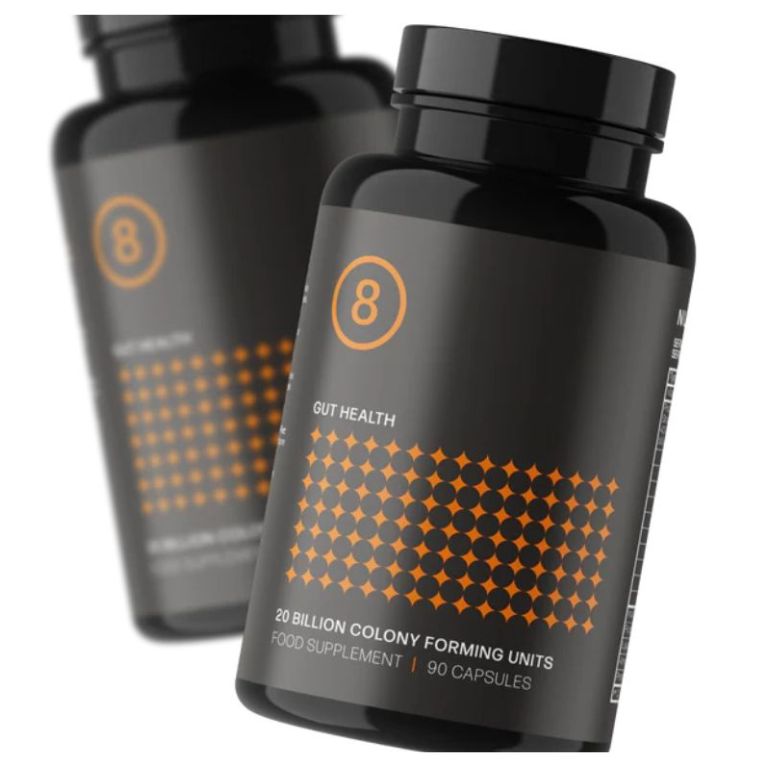
|
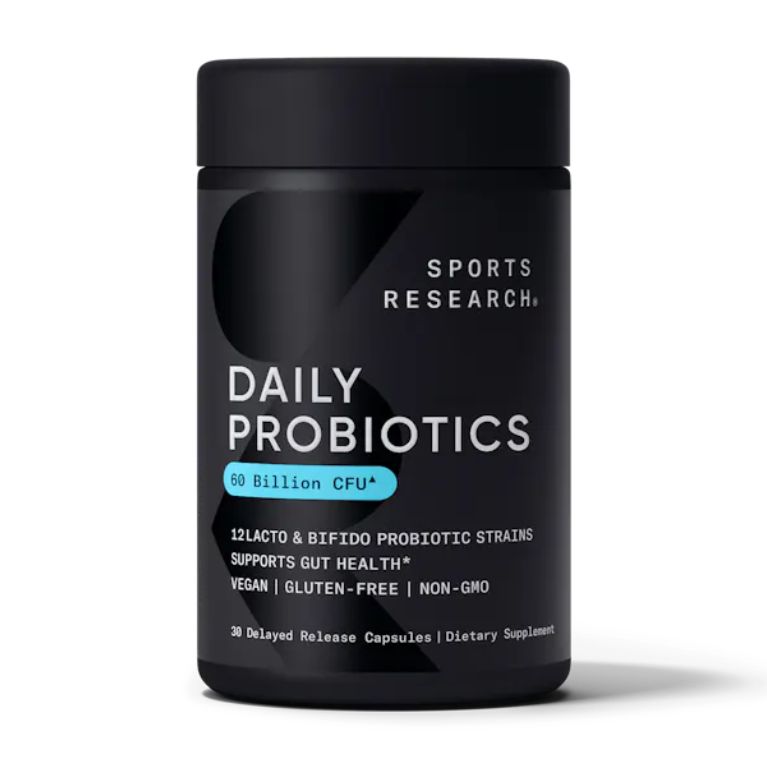
|
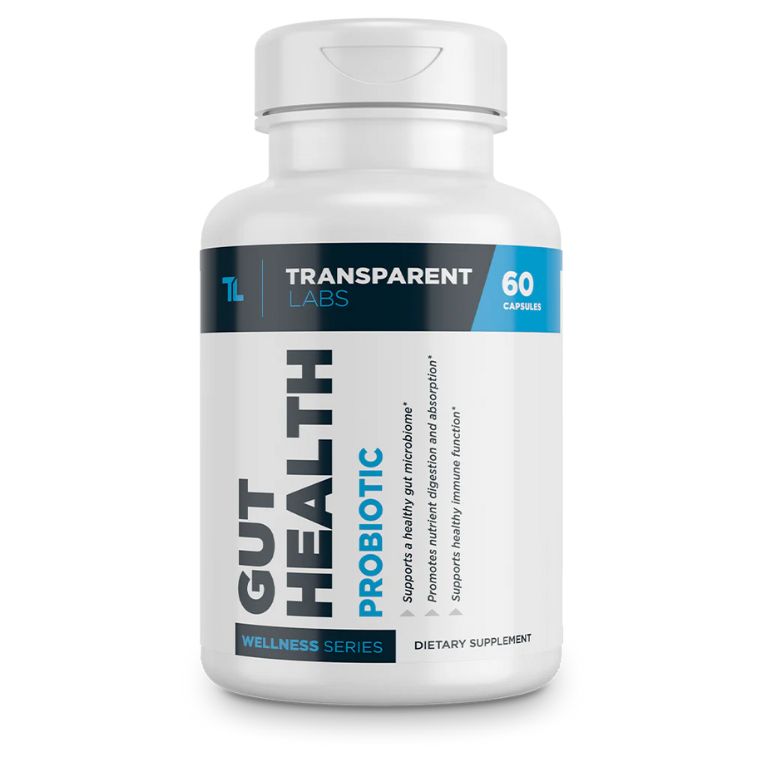
|
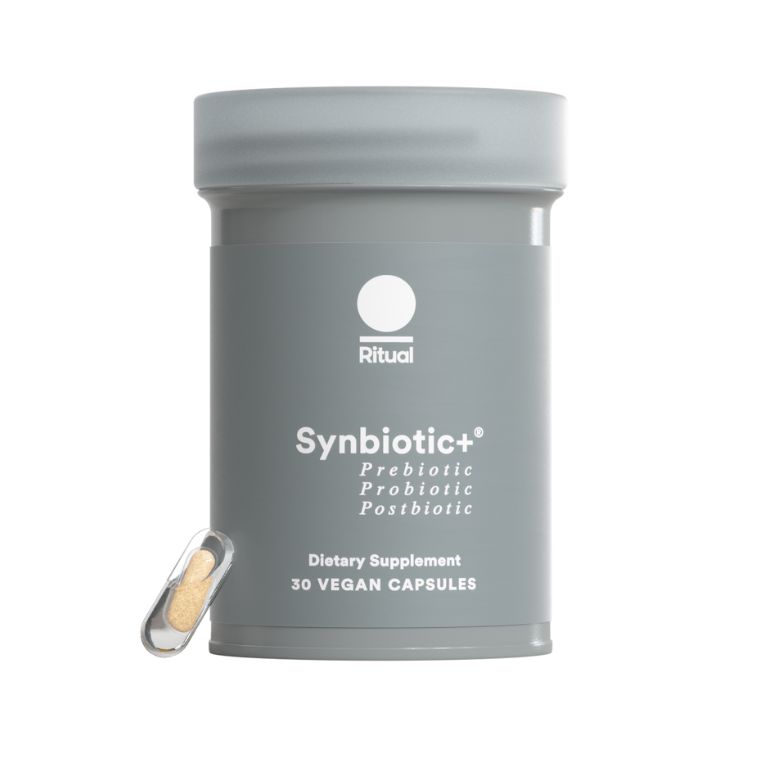
|
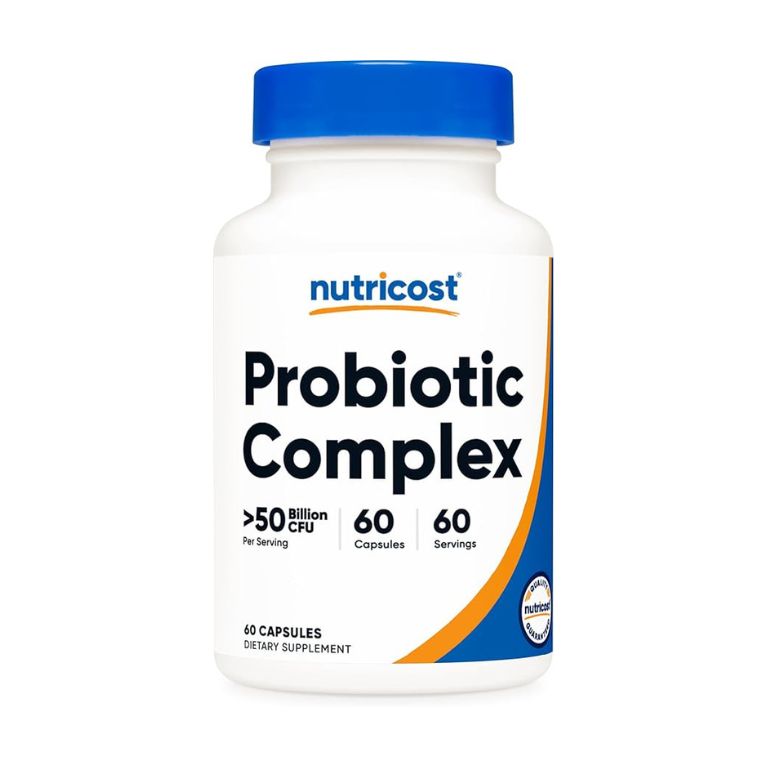
|
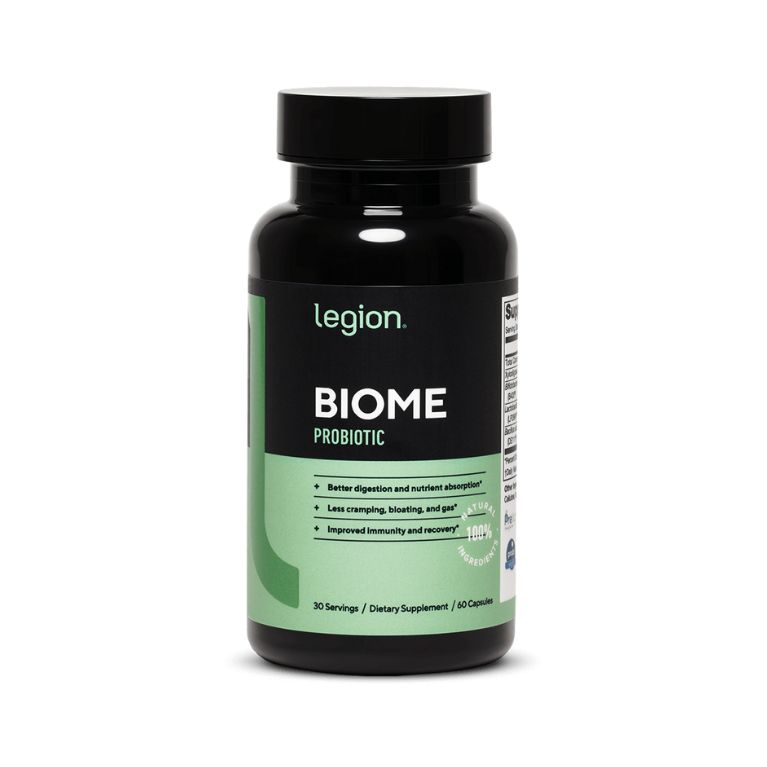
|
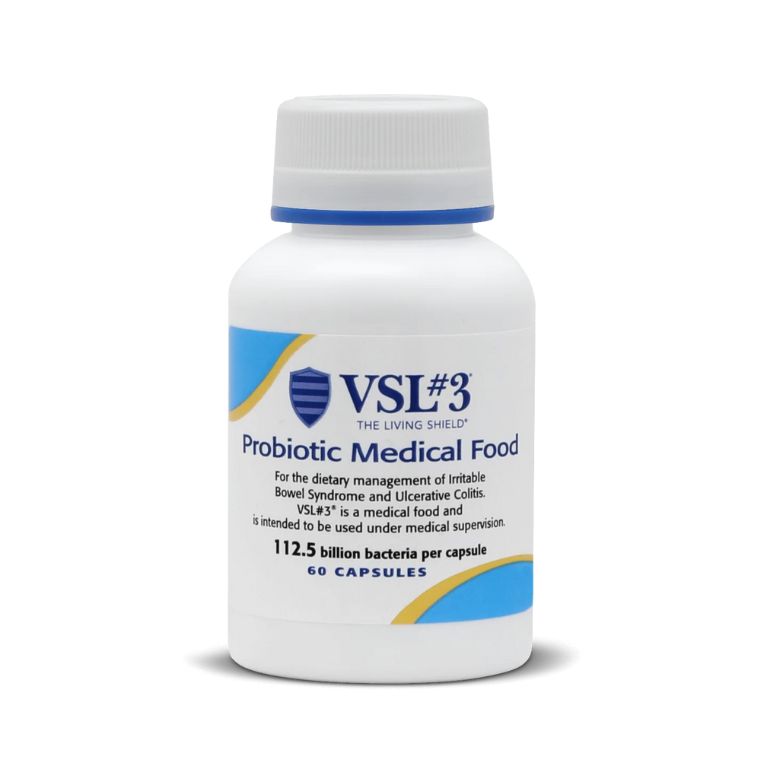
|
|
| Biotics 8 | Sports Research Daily Probiotics | Transparent Labs Gut Health | Ritual Synbiotic+ | Nutricost Probiotic Complex | Legion Athletics Biome | VSL#3 Capsules | |
| Rating | |||||||
| Cost per serving | $2.67 | $0.83 | $1.53 | $1.80 | $0.25 | $1.67 | $2.20 |
| Daily dose | 3 capsules | 1 capsule | 2 capsules | 1 capsule | 1 capsule | 2 capsules | 2 capsules |
| CFUs | 20 billion | 60 billion | 100 billion | 11 billion | 10 billion | 25 billion | 112.5 billion |
| Key ingredients | Lactobacilli, Bifidobacteria, and Saccharomyces strains, plus vitamin D, chicory root, digestive enzymes | 12 Lactobacilli, Lactococcus, and Bifidobacteria strains | Lactobacilli, Bifidobacteria, and Streptococci strains | Lactobacillus rhamnosus, Bifidobacterium animalis, LH01, T4D, Tributyrin | Lactobacillus, Lactococcus, Saccharomyces, and Bifidobacterium strains | Bifidobacterium lactis, Bacillus subtilis, Lactobacillus plantarum, PreticX® xylooligosaccharides | Lactobacilli, Bifidobacteria, and Streptococcus strains |
How we score the best probiotics for men
Every probiotic for men we review is rated across six primary categories. Each category is assigned a different percentage weight of the total score based on its relative importance when considering whether or not you should purchase a probiotic for men. Probiotics for men can also earn bonus credits that boost the overall rating for third-party testing credentials from NSF, Labdoor, and more.
You can check out our complete probiotic testing methodology here.
Testing criteria
Exclusion of proprietary blends—25%
There are many different probiotic strains, each designed to address a specific men’s health goal. Avoiding proprietary blends is crucial for transparency, allowing consumers to know exactly what and how much of each ingredient is included, ensuring a better assessment of the product’s effectiveness and safety.
Cultures contained—25%
Identifies the specific strains of probiotics or beneficial bacteria present in the product and how the strains support men’s health. The importance lies in the fact that different strains offer distinct health benefits, such as improved gut health, enhanced immunity, better digestion, or supporting male fertility.
Whether they’re encapsulated with a food source—20%
We determine if the probiotic cultures are paired with a prebiotic or other food source that nourishes the bacteria during digestion. This can enhance the survival rate of probiotics as they navigate through the digestive system, ensuring they reach the intestines effectively.
Whether cultures are alive—15%
This examines whether the probiotic cultures in the product are alive and viable at the time of consumption, which are necessary for the probiotics to exert their beneficial effects in the gut. The effectiveness of the product often depends on the survival of these cultures through processing and storage.
Colony forming units (CFUs) at end of shelf life—10%
CFUs represent the number of live microorganisms, typically bacteria, present in a probiotic supplement at the end of its shelf life. We like to see probiotics that provide at least 20 billion or more CFUs, though these are the ranges we consider:
- Under 1 billion
- 1 Billion to 4.9 Billion
- 5 Billion to 9.9 Billion
- 10 Billion to 19.9 Billion
- 20 Billion+
Form—5%
The form is important because it can affect how easily the product is consumed, absorbed, and stored. Different forms may also have varying shelf lives and convenience factors for the user.
We evaluate:
- Capsules
- Tablets
- Powders
- Liquids
FAQs
What is Biotics 8 used for?
Biotics 8 is a probiotic supplement marketed to men. It may improve certain aspects of digestive health and support a healthy body weight. Still, some of the claims made on the Biotics 8 website, such as the ability of the supplement to improve testosterone levels, aren’t backed by sound science.
Is Biotics 8 worth it?
There are other probiotic supplements that are third-party tested and more affordable, which makes them a better choice than Biotics 8.
How long does it take for Biotics 8 to work?
This depends. The website claims that Biotics 8 customers have noticed positive gut health results, such as improvements in bowel movements, in as little as two weeks. Probiotics may improve some symptoms, like diarrhea, within a few days. However, some people may have to take probiotics for a few weeks to notice any significant changes to their health. (31)
These statements have not been evaluated by the Food and Drug Administration. These products are not intended to diagnose, treat, cure, or prevent any diseases.
Our experts
Victoria Burgess, Ph.D., CSCS, CISSN
Victoria Burgess earned her Ph.D. in Health and Human Performance from Concordia University Chicago and holds her NSCA CSCS and Certified Sports Nutritionist (CISSN). She is an adjunct professor in the Human Performance and Nutrition department at Concordia University Chicago & Parker University, where she teaches undergraduate, graduate, and doctoral-level courses.
Joana Neziri, M.S., NASM CPT
Joana is a writer, editor, and content strategist focusing on nutrition, fitness, and all things health. After earning a master’s degree in business from the University of North Florida, she began a career in research and digital marketing.
Jessica Coulon
Jessica is a contributing editor and writer who specializes in fitness, health, nutrition, and science content. Previously, she was an editor for Popular Mechanics and Bicycling, where she covered pro cycling news, wrote how-to guides, and tested all the latest and greatest bike gear. She was also a regular shoe tester and contributor for Runner’s World. You can often find her skiing or riding her mountain bike, and racing with the F1RE female enduro team.
Kelly Uhler
Kelly has a multifaceted background in elder care, health care, and copywriting. She has worked for organizations such as A Place For Mom and Homecare.com, which gave her the opportunity to work closely with families, providing reliable information to help them make informed decisions about their loved one’s health, safety, and quality of life.

Jillian Kubala, RD
Fortune Recommends Nutrition Writer
About Author
References
- Al-Sharefi, A., Wilkes, S., Jayasena, C. N., & Quinton, R. (2020). How to manage low testosterone level in men: a guide for primary care. The British journal of general practice : the journal of the Royal College of General Practitioners, 70(696), 364–365. https://doi.org/10.3399/bjgp20X710729
- Mari, A., Mahamid, M., Amara, H., Baker, F. A., & Yaccob, A. (2020). Chronic Constipation in the Elderly Patient: Updates in Evaluation and Management. Korean journal of family medicine, 41(3), 139–145. https://doi.org/10.4082/kjfm.18.0182
- Sharma, S., Kumar, S., Sajjad, S., & Sharma, S. (2023). Probiotics in Irritable Bowel Syndrome: A Review Article. Cureus, 15(3), e36565. https://doi.org/10.7759/cureus.36565
- Youssef, M., Ahmed, H. Y., Zongo, A., Korin, A., Zhan, F., Hady, E., Umair, M., Shahid Riaz Rajoka, M., Xiong, Y., & Li, B. (2021). Probiotic Supplements: Their Strategies in the Therapeutic and Prophylactic of Human Life-Threatening Diseases. International journal of molecular sciences, 22(20), 11290. https://doi.org/10.3390/ijms222011290
- Maretti, C., & Cavallini, G. (2017). The association of a probiotic with a prebiotic (Flortec, Bracco) to improve the quality/quantity of spermatozoa in infertile patients with idiopathic oligoasthenoteratospermia: a pilot study. Andrology, 5(3), 439–444. https://doi.org/10.1111/andr.12336
- Yao, S., Zhao, Z., Wang, W., & Liu, X. (2021). Bifidobacterium Longum: Protection against Inflammatory Bowel Disease. Journal of immunology research, 2021, 8030297. https://doi.org/10.1155/2021/8030297
- Kazemian, E., Pourali, A., Sedaghat, F., Karimi, M., Basirat, V., Sajadi Hezaveh, Z., Davoodi, S. H., & Holick, M. F. (2023). Effect of supplemental vitamin D3 on bone mineral density: a systematic review and meta-analysis. Nutrition reviews, 81(5), 511–530. https://doi.org/10.1093/nutrit/nuac068
- Chen, J., Chen, X., & Ho, C. L. (2021). Recent Development of Probiotic Bifidobacteria for Treating Human Diseases. Frontiers in bioengineering and biotechnology, 9, 770248. https://doi.org/10.3389/fbioe.2021.770248
- Li, B., Liang, L., Deng, H., Guo, J., Shu, H., & Zhang, L. (2020). Efficacy and Safety of Probiotics in Irritable Bowel Syndrome: A Systematic Review and Meta-Analysis. Frontiers in pharmacology, 11, 332. https://doi.org/10.3389/fphar.2020.00332
- Perna, S., Ilyas, Z., Giacosa, A., Gasparri, C., Peroni, G., Faliva, M. A., Rigon, C., Naso, M., Riva, A., Petrangolini, G., A Redha, A., & Rondanelli, M. (2021). Is Probiotic Supplementation Useful for the Management of Body Weight and Other Anthropometric Measures in Adults Affected by Overweight and Obesity with Metabolic Related Diseases? A Systematic Review and Meta-Analysis. Nutrients, 13(2), 666. https://doi.org/10.3390/nu13020666
- National Institutes of Health.Vitamin D. Accessed on October 23rd, 2024.
- Caetano, M. A. F., & Castelucci, P. (2022). Role of short chain fatty acids in gut health and possible therapeutic approaches in inflammatory bowel diseases. World journal of clinical cases, 10(28), 9985–10003. https://doi.org/10.12998/wjcc.v10.i28.9985
- Graham, D. Y., Ketwaroo, G. A., Money, M. E., & Opekun, A. R. (2018). Enzyme therapy for functional bowel disease-like post-prandial distress. Journal of digestive diseases, 19(11), 650–656. https://doi.org/10.1111/1751-2980.12655
- Terpou, A., Papadaki, A., Lappa, I. K., Kachrimanidou, V., Bosnea, L. A., & Kopsahelis, N. (2019). Probiotics in Food Systems: Significance and Emerging Strategies Towards Improved Viability and Delivery of Enhanced Beneficial Value. Nutrients, 11(7), 1591. https://doi.org/10.3390/nu11071591
- National Institutes of Health. Probiotics.
- Mitelmão, F. C. R., Häckel, K., Bergamaschi, C. C., Gerenutti, M., Silva, M. T., Balcão, V. M., & Vila, M. M. D. C. (2022). The effect of probiotics on functional constipation in adults: A randomized, double-blind controlled trial. Medicine, 101(43), e31185. https://doi.org/10.1097/MD.0000000000031
- Chen, M., Yuan, L., Xie, C. R., Wang, X. Y., Feng, S. J., Xiao, X. Y., & Zheng, H. (2023). Probiotics for the management of irritable bowel syndrome: a systematic review and three-level meta-analysis. International journal of surgery (London, England), 109(11), 3631–3647. https://doi.org/10.1097/JS9.000000000000
- Torres, B., Sánchez, M. C., Virto, L., Llama-Palacios, A., Ciudad, M. J., & Collado, L. (2024). Use of probiotics in preventing and treating excess weight and obesity. A systematic review. Obesity science & practice, 10(3), e759. https://doi.org/10.1002/osp4.759
- Czajeczny, D., Kabzińska, K., & Wójciak, R. W. (2021). Does probiotic supplementation aid weight loss? A randomized, single-blind, placebo-controlled study with Bifidobacterium lactis BS01 and Lactobacillus acidophilus LA02 supplementation. Eating and weight disorders : EWD, 26(6), 1719–1727. https://doi.org/10.1007/s40519-020-00983-8
- Ljunggren, L., Butler, E., Axelsson, J., Åström, M., & Ohlsson, L. (2024). Effects of probiotic supplementation on testosterone levels in healthy ageing men: A 12-week double-blind, placebo-controlled randomized clinical trial. Contemporary clinical trials communications, 39, 101300. https://doi.org/10.1016/j.conctc.2024.101300
- Abboud, M., Rizk, R., AlAnouti, F., Papandreou, D., Haidar, S., & Mahboub, N. (2020). The Health Effects of Vitamin D and Probiotic Co-Supplementation: A Systematic Review of Randomized Controlled Trials. Nutrients, 13(1), 111. https://doi.org/10.3390/nu13010111
- Krumina, E., Ocanto, A., & Couñago, F. (2024). Vitamin D and prostate cancer prevention. World journal of clinical oncology, 15(6), 691–694. https://doi.org/10.5306/wjco.v15.i6.691
- National Library of Medicine. Vitamin D Deficiency. Accessed on October 23rd, 2024.
- Sheng, W., Ji, G., & Zhang, L. (2023). Immunomodulatory effects of inulin and its intestinal metabolites. Frontiers in immunology, 14, 1224092. https://doi.org/10.3389/fimmu.2023.1224092
- Dou, Y., Yu, X., Luo, Y., Chen, B., Ma, D., & Zhu, J. (2022). Effect of Fructooligosaccharides Supplementation on the Gut Microbiota in Human: A Systematic Review and Meta-Analysis. Nutrients, 14(16), 3298. https://doi.org/10.3390/nu14163298
- Lewis, D. M., & Shahid, A. (2023). Survey of Pancreatic Enzyme Replacement Therapy Dosing Experiences in Adults with Exocrine Pancreatic Insufficiency. Healthcare (Basel, Switzerland), 11(16), 2316. https://doi.org/10.3390/healthcare11162316
- Memorial Sloane Kettering Cancer Center. Probiotics. Accessed October 21st, 2024.
- Benjak Horvat, I., Gobin, I., Kresović, A., & Hauser, G. (2021). How can probiotic improve irritable bowel syndrome symptoms?. World journal of gastrointestinal surgery, 13(9), 923–940. https://doi.org/10.4240/wjgs.v13.i9.923
- Purdel, C., Ungurianu, A., Adam-Dima, I., & Margină, D. (2023). Exploring the potential impact of probiotic use on drug metabolism and efficacy. Biomedicine & pharmacotherapy = Biomedecine & pharmacotherapie, 161, 114468. https://doi.org/10.1016/j.biopha.2023.114468
- National Library of Medicine. Probiotics.
- Collinson, S., Deans, A., Padua-Zamora, A., Gregorio, G. V., Li, C., Dans, L. F., & Allen, S. J. (2020). Probiotics for treating acute infectious diarrhoea. The Cochrane database of systematic reviews, 12(12), CD003048. https://doi.org/10.1002/14651858.CD003048
